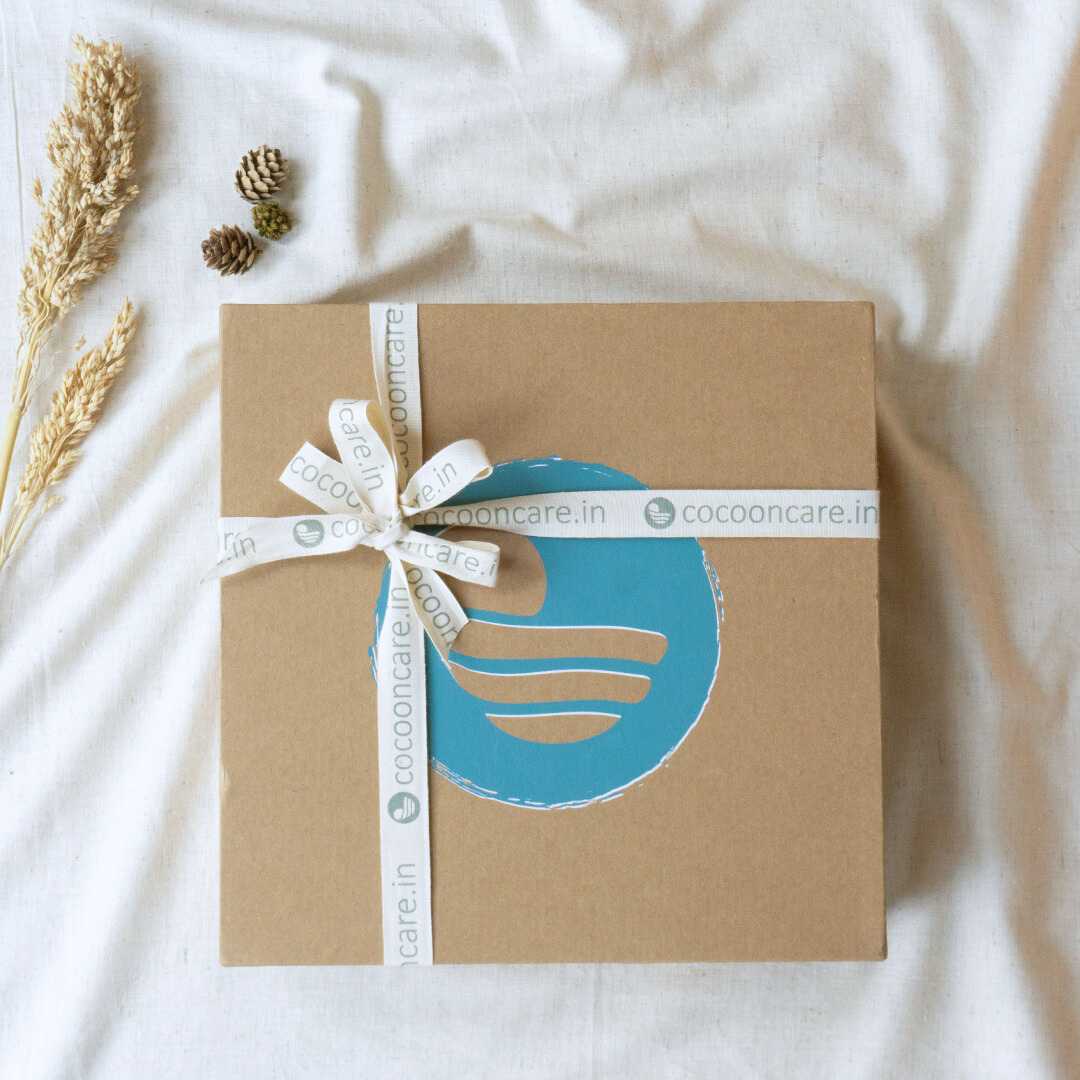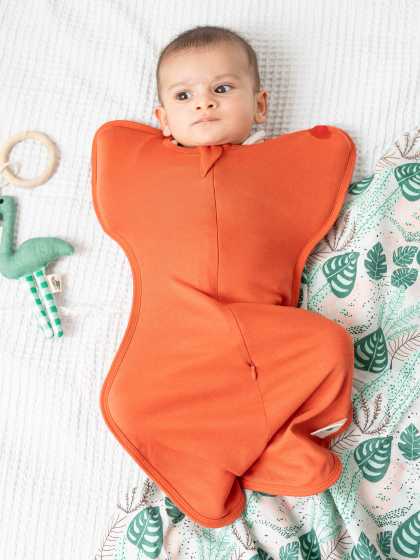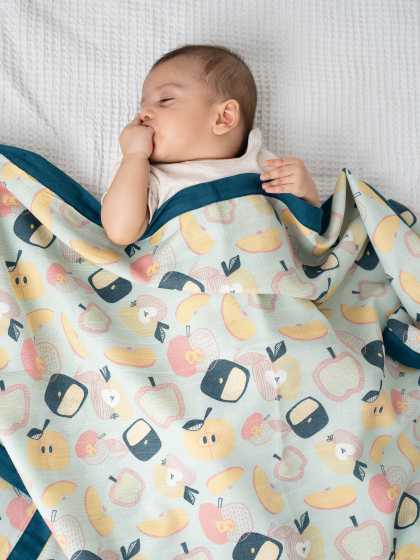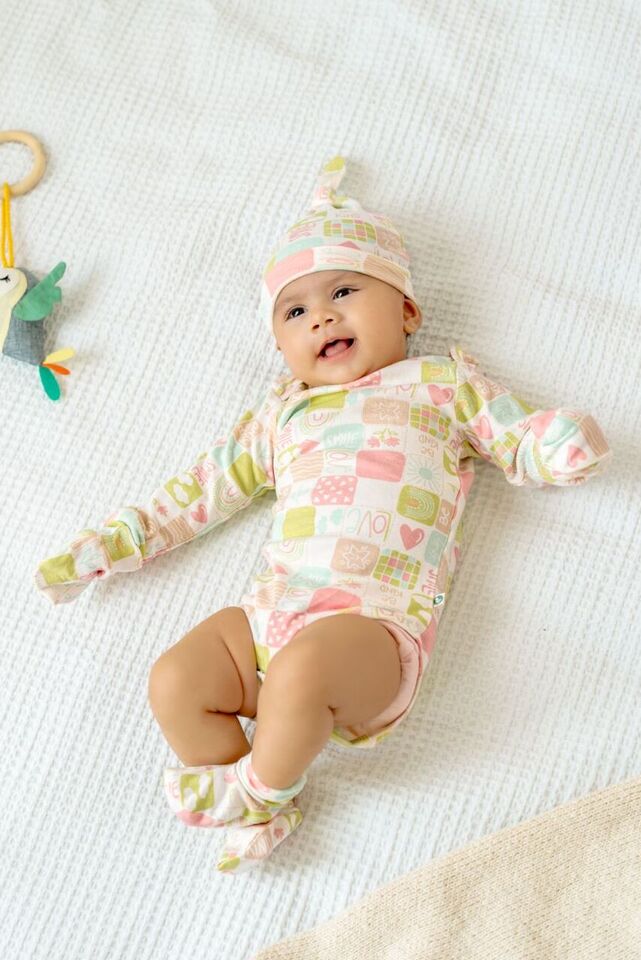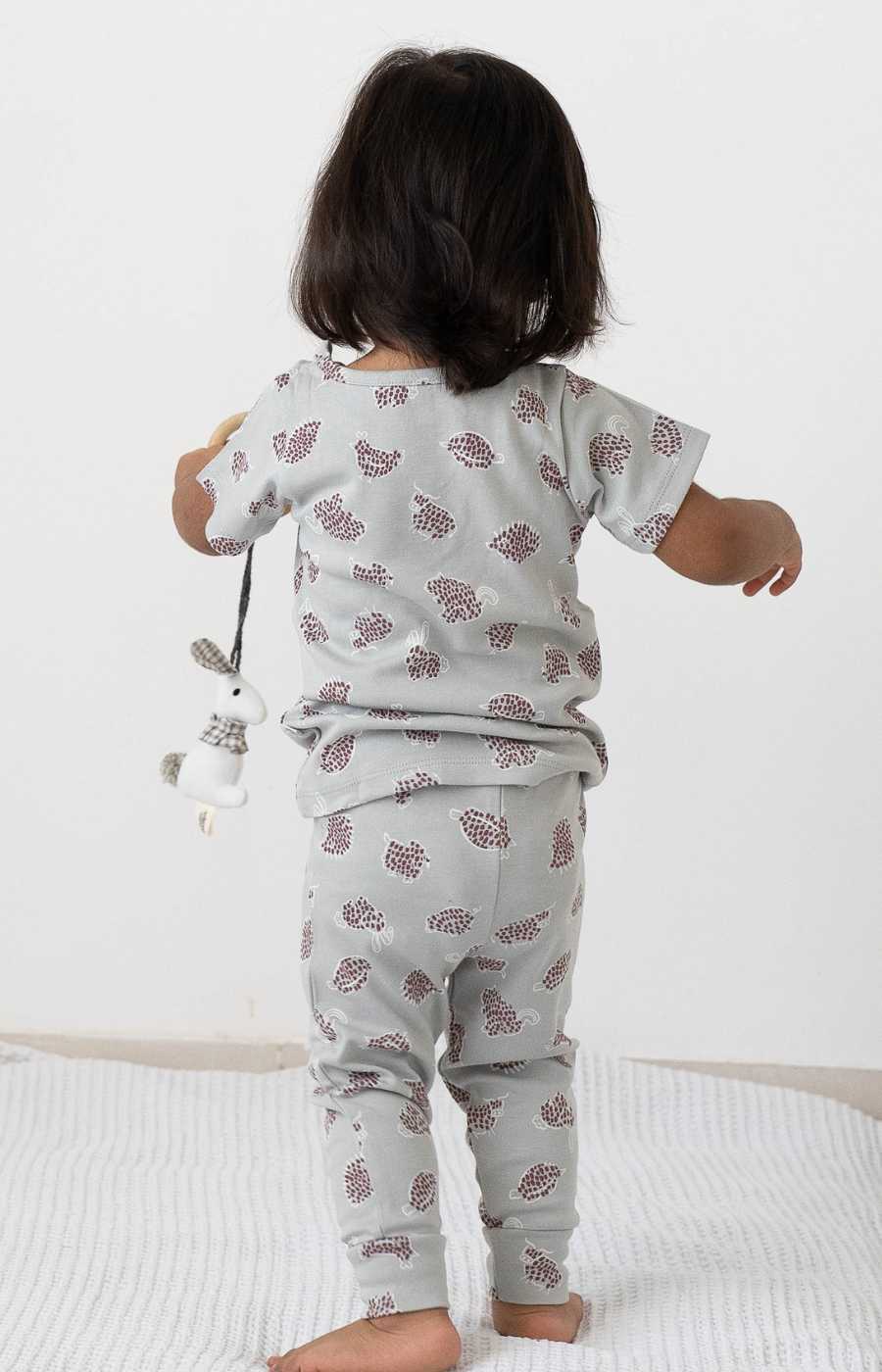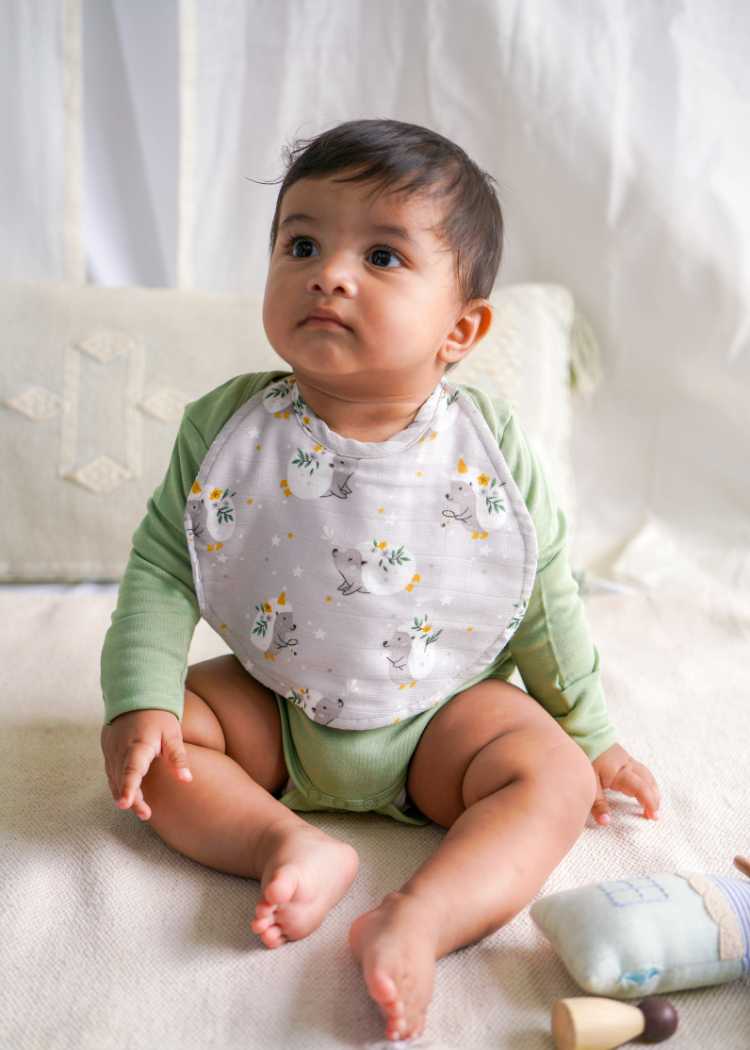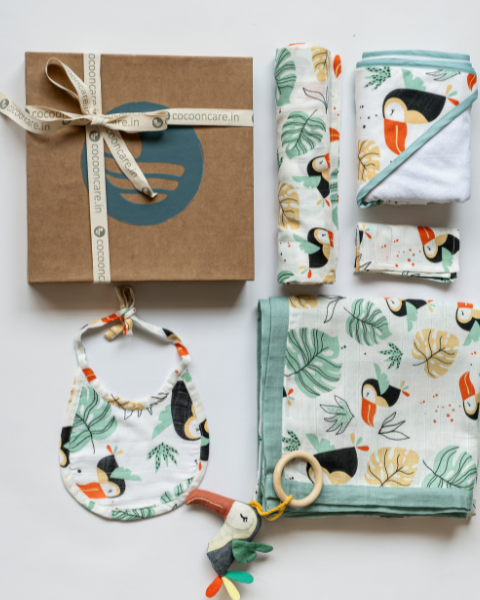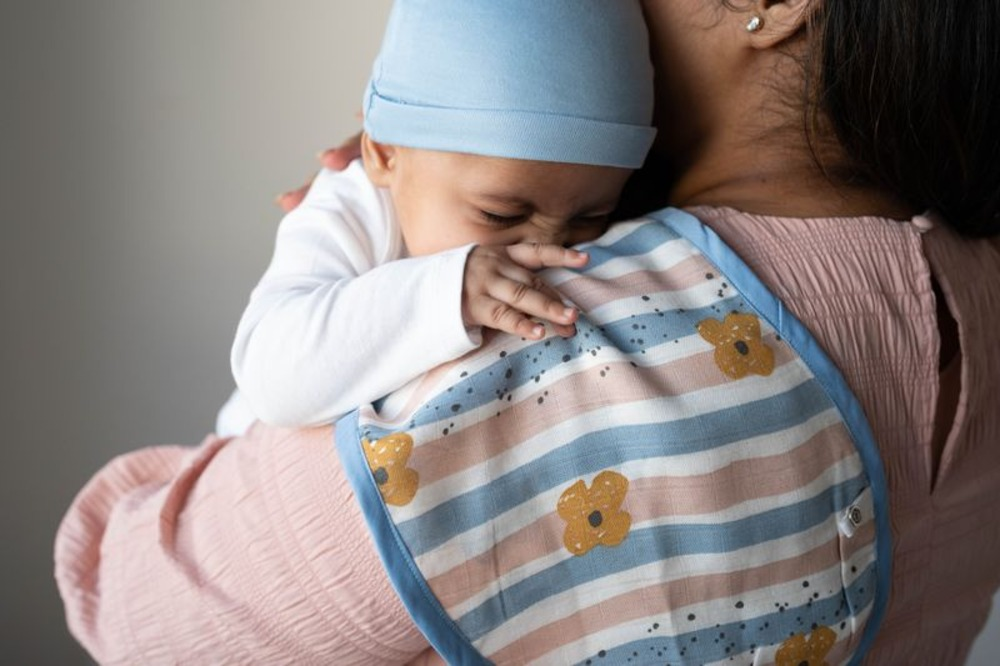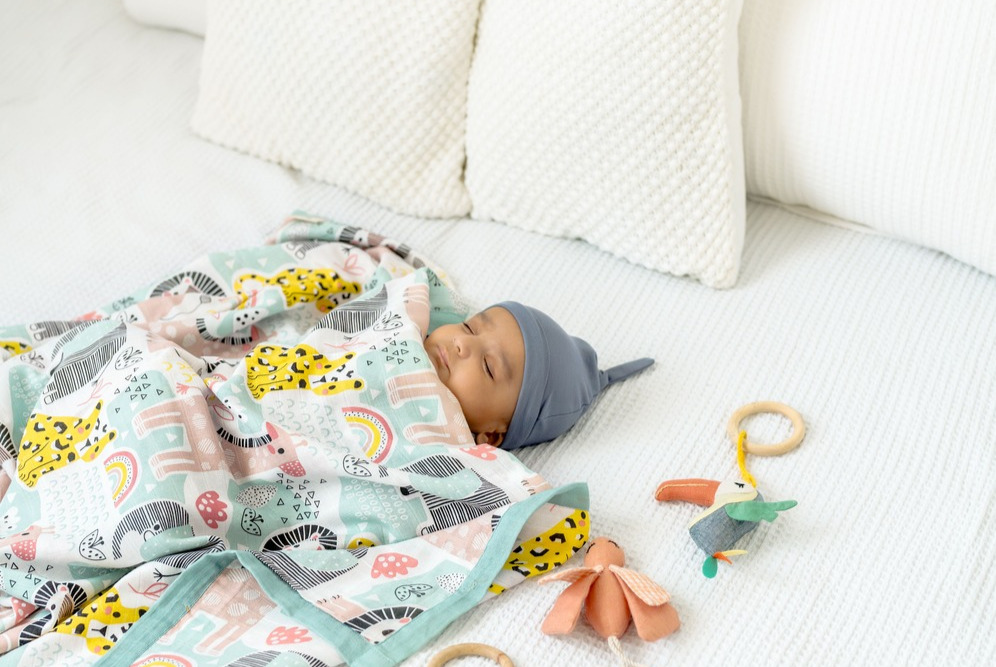Key Takeaways
-
It is normal for the baby to sleep only when held as it mimics the comfort of the womb.
-
Have age-appropriate expectations. Newborns (0–3 months) need more closeness, while babies 3+ months can begin learning self-soothing. As the baby grows, encourage independent sleep for their safety and routine.
-
Create consistent sleep habits by encouraging daytime crib time, using gentle routines, and avoiding early “cry it out” methods.
In This Article
- Key Takeaways In This Article
- In This Article
- Introduction
- Is It Okay to Let Your Baby Sleep in Your Arms?
- Why Baby Only Sleeps When Held
- Is It Okay For a Baby To Sleep On You?
- Tips To Get a Newborn To Sleep Without Being Held
- What Not to Do: Common Mistakes to Avoid
- When to Seek Help From a Paediatrician or Sleep Consultant
- Frequently Asked Questions On Baby Sleeping on Arms
Introduction
You're not alone if your baby won’t sleep without being held. Being a mom, I understand that it can be emotionally and physically draining, even while the intimacy is lovely and incredibly connecting. Whether it's my baby sleeping on my chest, sleeping in my arms, or sleeping on my lap, these cozy positions bring warmth and security, but after hours of holding my baby, my arms become numb, and I am ready to crash.
In this blog, I will take you through topics like: why your infant may insist on being carried to sleep, how to get your baby to sleep without being held, and most importantly, gentle, practical alternatives like Cocoon Care’s baby swaddle, baby sleeping bag and more.
Is It Okay to Let Your Baby Sleep in Your Arms?
It is perfectly fine to let your baby sleep in your arms however, it can be a tiring process.
-
Safety considerations and expert opinions
Sleeping in arms or having a baby sleeping on mom's chest can be safe if you're awake and attentive. [1] According to pediatric sleep guidelines from the American Academy of Pediatrics (AAP), holding your baby while they sleep is safe only when you are fully awake and attentive. If you're sitting on a sofa, recliner, or bed, there's a risk that you may fall asleep too, which can create an unsafe sleep environment. When caregivers doze off with a baby sleeping on their chest, the soft surfaces and lack of supervision significantly raise the risk of suffocation or Sudden Infant Death Syndrome (SIDS).
Safe Baby Sleep Practices:
-
Put your infant in a newborn baby sleep pod made specifically for their comfort and breathability to help the baby fall asleep.
-
To encourage independent sleep and replicate the comfort of your hug, use a baby swaddle.
-
Short-term comfort vs. long-term habits
Holding your baby is comfortable for a while, but over time, it might build sleep associations that make it difficult for your infant to fall asleep independently. Learning how to make baby sleep on their own is a peaceful, progressive process, and Cocoon Care is here to help.
-
When holding is fine — and when it’s time to encourage change
In the early newborn stage, sleeping on your chest or being held to sleep is normal. However, by 3–4 months, the baby may begin transitioning to sleeping alone by employing gentle sleep training methods for infants.
Why Baby Only Sleeps When Held
-
It Is A Behaviour They Learn From The Womb
Babies are held in the womb, and the environment of the womb is very warm and comforting. It is normal for them to crave the same environment after their birth, and it takes time to adjust. Because of this, the baby only sleeps when held, as your arms mimic that cozy, comfortable setting.
-
Temperature and Breathing Regulation
Because your body helps control their breathing and body temperature, babies love sleeping on your chest. Your infant could just miss your warmth if they fuss when you put them down.
To provide soft warmth in the cot, try using a baby blanket to offer gentle warmth in the crib. Breathable bamboo muslins are perfect for every season, and baby jhablas from Cocoon Care help to maintain comfort and hygiene.
-
Supported Sleep Becomes A Habit
How to sleep through the night without waking up? Babies quickly learn to associate sleeping in arms with rest. Over time, this turns into a sleep dependency. Breaking this cycle requires consistent cues and gentle nudging toward independent sleep.
-
Developmental Stages and Sleep Associations
As babies grow, their brain starts associating sleep with specific actions. For example, being rocked, fed or held. Around 3–6 months, your baby is ready to begin learning how to fall asleep without these props.
Is It Okay For a Baby To Sleep On You?
Yes—occasionally. Baby sleeping on the chest during naps or quiet moments is a fulfilling bonding experience. However, for nighttime sleep, it’s safest to lay your baby down in a crib or newborn baby sleep pod.
Tips To Get a Newborn To Sleep Without Being Held
Here are some tips you can use to get your newborn to sleep without being held.
Tip #1: Set Realistic Age-appropriate Expectations
Infants aged 0–3 months:
Your little kiddo is still getting used to life outside the womb at this stage. Wanting to be carried is quite natural, and frequent feeding and comfort are crucial. Prioritise connection, attentive care, and fundamental sleep patterns above rigid timetables.
Babies older than three months:
Your child is ready to begin a mild sleep schedule. You can gradually urge them to sleep through the night without waking up by providing brief intervals of autonomous slumber.
Tip #2: Swaddling Is Good For A Newborn Baby
Swaddling helps mimic the womb’s snug environment and prevents the startle reflex, which can wake your baby. Cocoon Care’s baby swaddles are designed to be breathable and easy to use.
-
Wrap snugly yet comfortably, but not too tightly.
-
When swaddling your infant, always position them on their back.
-
Once your baby begins to roll over, stop swaddling them.
Swaddling is a traditional newborn sleep tip that helps many newborns fall asleep sooner and sleep longer.
Tip #3: Snuggle With Baby Before Going To Sleep
As an alternative to rocking your infant to sleep, soothe and snuggle them until they are sleepy, then place them in a baby sleeping bag. This facilitates your baby's learning to go to sleep on their own without abrupt separation.
Tip #4: Help your little one get accustomed to their sleep space during awake times
During the day, allow your infant to enjoy peaceful, awake time in their newborn baby sleep pod or crib. This makes the sleeping area more reassuring and less frightening by creating good connections with it
Tip #5: Allow Your Baby To Sleep On Their Own
You can practice placing your baby down when they are drowsy but still awake. This helps them learn to fall asleep without needing to be held every time.
Tip #6: Make Your Baby Take a Nap In the Crib Once A Day
You can start with just one crib nap daily to ease the transition and gradually increase crib sleep sessions as your baby becomes more comfortable.
Here is a quick summary of the tips to get a newborn to sleep without being held
|
Tip # |
Tip Title |
Details |
|
1 |
Set Realistic Age-appropriate Expectations |
Babies 0–3 months need frequent feeding and comfort. Moms should focus on bonding and basic routines. For babies over 3 months, you can begin gentle sleep routines by encouraging short periods of independent sleep. |
|
2 |
Swaddling Is Good for a Newborn Baby |
Swaddling helps mimic the womb environment and soothes the baby, and promotes longer sleep sessions. You can ensure safe swaddling for newborns techniques. |
|
3 |
Snuggle With Baby Before Going to Sleep |
Cuddling before sleep helps your baby feel secure and loved. A calm and comforting routine can make the transition to crib sleeping smoother. |
|
4 |
Help Your Little One Get Accustomed to Their Sleep Space During Awake Times |
Let your baby spend playtime in the crib or bassinet during the day. This helps them associate the space with safety and comfort, not just separation. |
|
5 |
Allow Your Baby to Sleep on Their Own |
Practice placing your baby down when they are drowsy but still awake. This helps them learn to fall asleep without needing to be held every time. |
|
6 |
Make Your Baby Take a Nap in the Crib Once a Day |
Start with just one crib nap daily to ease the transition. Gradually increase crib sleep sessions as your baby becomes more comfortable. |
What Not to Do: Common Mistakes to Avoid
It's normal to feel scared or irritated when training your baby to sleep without being held. However, hurrying the process or using the incorrect methods might result in more restless nights for both you and your newborn child. Here are some typical errors to steer clear of:
-
Letting your baby cry it out too early (before 5–6 months)
While some newborn sleep training techniques include allowing the infant to cry for brief periods of time, cry-it-out techniques before the age of five to six months can be dangerous if not carried out under the right supervision. Your infant still requires regular feedings and interaction at this point in order to develop emotionally. That is why using drastic measures, such as extended weeping, to get your infant to sleep if they won't be carried might lead to tension and uneasiness. You must talk to your pediatrician about sleep training if you're thinking about using it in any form.
-
Making sudden, drastic changes to sleep routines overnight:
You may be tempted to move your infant from in-arm to complete crib sleep for the night, but sudden shifts can cause anxiety..In order to establish a comfortable and familiar environment, start with tiny steps, like one crib nap per day, and use comforting tools like a newborn baby sleep pod, baby sleeping bag, or baby swaddle. Your kid will eventually be able to sleep on their own without any shock or resistance thanks to these gradual changes.
-
Being inconsistent in your approach:
The first day, you rock your baby to sleep, the second day you attempt drowsy-but-awake, and the third day you let them wail for a few minutes. This level of irregularity makes it difficult for your infant to form consistent sleep connections.
Babies rely on consistency and predictability. You have to stick to your strategy for at least 7-10 days before evaluating the outcomes. When it comes to teaching your infant how to sleep without being carried, consistency is crucial.
When to Seek Help From a Paediatrician or Sleep Consultant
Sometimes, even your best efforts may not lead to restful sleep for you or your baby.
Seek professional support if:
-
Your baby is over 6 months old and still wakes frequently.
-
You feel exhausted or overwhelmed.
-
You have concerns about safe sleep practices.
A sleep consultant can provide customised guidance on gentle sleep training methods for infants based on your baby’s temperament and needs.
Frequently Asked Questions On Baby Sleeping on Arms
1. What do I do if my baby won't sleep unless being held?
As a mom, you can start by building a calming bedtime routine and introducing sleep cues like a baby swaddle. Swaddling mimics the warmth and snugness of your arms, helping your baby feel secure while transitioning to independent sleep.
2. How do I stop my baby from wanting to be held all the time?
I know it can be exhausting, and therefore, I encourage solo rest by letting your baby explore their crib during calm, awake times. This helps create positive associations with their sleep space without feeling like a separation.
3. At what age do babies sleep without being held?
So, most babies begin sleeping independently between 3–6 months. Using a baby sleeping bag can offer comfort and consistency, easing them into solo sleep while still feeling snug and secure.
4. Is it normal for my baby to only sleep when being held?
Yes, it's a common part of early development. According to many newborn sleep tips, contact naps are expected in the early weeks as babies adjust to life outside the womb. Gradual change is key.
5. Will holding my baby to sleep create bad habits?
In the newborn stage, it’s not a concern. But after 3–4 months, you can begin gentle sleep training for babies to prevent long-term sleep associations and encourage self-soothing.
6. What should I do if my baby cries when I put them down?
Try to comfort your baby without picking them up right away. Understanding why does my baby cry when I put them down is often linked to needing reassurance. Offer touch, voice, or gentle patting in the crib.
7. Can swaddling really help my baby sleep better?
Yes! It’s one of the best sleep tips for newborns who won’t sleep alone. A well-fitted swaddle reduces startle reflexes and mimics the womb, helping babies stay asleep longer.
8. How long does it take for babies to learn to sleep on their own?
With consistent practice, many babies adjust within 1–2 weeks. Patience and repetition help the baby sleep independently without stress or resistance.
9. Should I try sleep training?
If your baby is over 4 months, yes, but choose how to teach your baby to fall asleep without being held with approaches that are gentle, supportive, and age-appropriate. Always consult a pediatrician if unsure.
Citations
Related blogs
With Love, from Cocoon Care
Dear Parent,
No matter where you are, your baby deserves gentle beginnings and comforting care. At Cocooncare, we pour love into every stitch. From soft muslin swaddles to cozy sleep pods and thoughtfully made newborn clothing, our essentials hold your baby with the same tenderness as you do. You can find baby essentials on our website and also on Amazon, Firstcry, Myntra, Nykaafashion and DuckDuck baby.
Because every baby deserves to be cocooned in care.
About the author
Renu Agrawal, a devoted new mom and passionate advocate for gentle parenting, is the heart behind this blog. Inspired by her journey into motherhood, Renu’s writing is rooted in real-life experiences—the joys, challenges, and tiny triumphs of raising a newborn. With a deep belief in conscious, comforting care, she shares thoughtful insights, practical tips, and a mother’s instinctive wisdom to help other parents navigate the early days of babyhood. Through Cocoon Care, Renu brings together safe, sustainable, and soft essentials that every baby and parent deserves
Popular Searches
Bottom wear | Baby Clothes Online | Newborn Romper | Baby Gift Set | Sleep Essentials | Burp cloths | Baby Bibs Online | Nappy For Baby | Hooded Baby Towel | Baby Mittens | Baby Sleep Sack | Baby nightsuit
